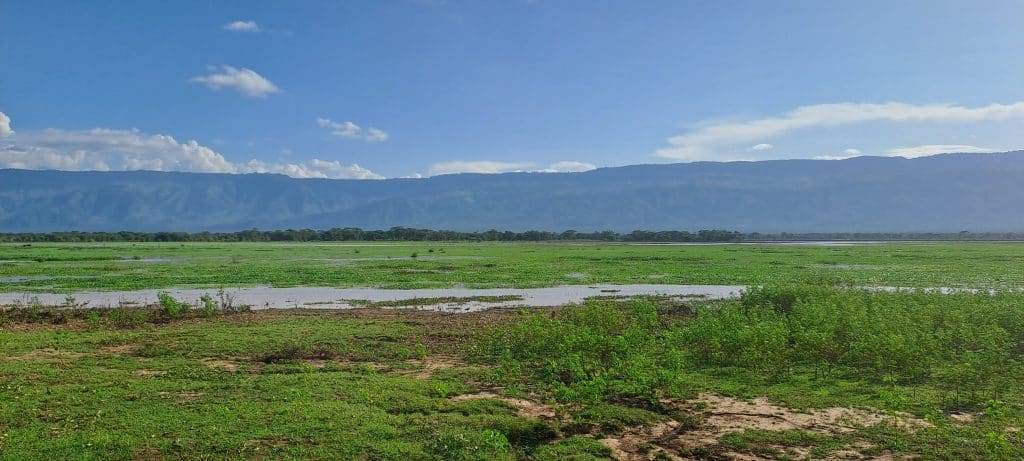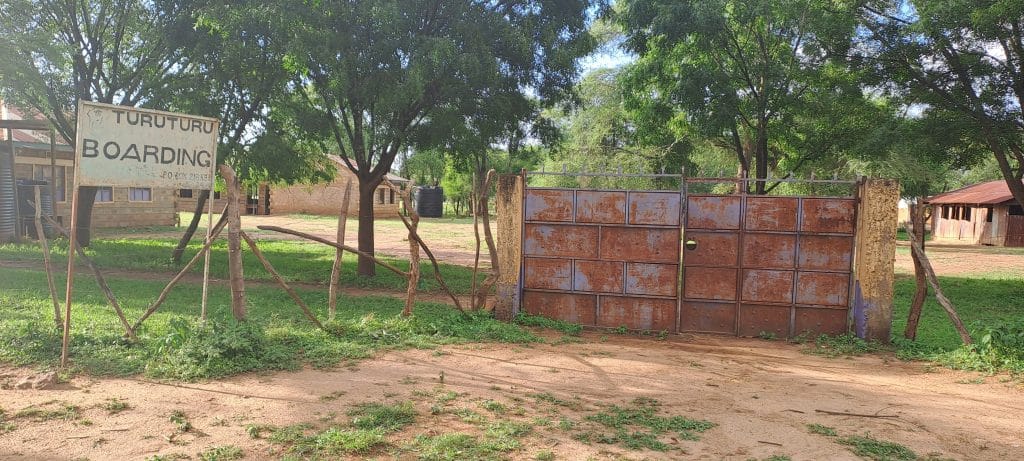
Lake Kamnarok. For security reasons, community members prefer not to appear in the pictures.
Mr. X used not to worry about how it would feed his family. He had a small piece of land and enough crops to live with dignity. But when oil companies arrived in Kamnarok, life became tough. Without asking for his consent and without providing any compensation, in May 2015 big machinery passed through his field to conduct oil exploration activities. They destroyed all his crops and eroded the land: since then, Mr. X has not been able to plant anything else.
Located in Western Kenya, in the Baringo North Sub County, in 1980 Kamnarok was demarcated as community land, but three years later some of the area was identified as part of the Lake Kamnarok national reserve.
Rich in natural resources and biodiversity, this territory in the past decade has been attracting the interests of both oil companies and conservation agencies. But amidst these competing interests, local communities’ needs have been forgotten and their rights have been crushed. Mr. X and the other community members have been facing an endless cycle of forced and violent relocations, loss of livelihoods, and threats.
“We have nowhere to go: this is our ancestral land and source of livelihood,” says a local community member (anonymous for security reasons). “Public participation is the way to go, development needs to be inclusive. If there is any planned conservation project, then the community must be involved and the threats of arrests need to stop immediately”.
In 2019, the local government of Baringo County signed a memorandum of understanding with the conservation agency Northern Rangelands Trust. Today NRT operates conservancies on over 10 % of Kenya’s land. Despite NRT’s poor human rights track record, the agency has received millions of dollars from well-known organizations and institutions, including the European Union, USAID, the World Wildlife Fund, and the French Development Agency (AFD).
According to local community members, a recent wave of evictions in the area might be linked to this agreement with NRT, as it might be a strategy to pave the way for demarcating this territory for conservation projects.
For the community in Kamnarok, forced evictions are not new. In 2012, when the first oil and gas exploration activities started, many people lost their homes and their fields.
The initial operations were conducted by the company Tullow Oil Plc. In 2015, the license to conduct oil and gas exploration in this area (known as Block 12A) was transferred to the UK-based Delonex Energy Limited. To expand its activities, Delonex could count on a powerful supporter: in 2013, the International Finance Corporation (IFC) – the World Bank’s private sector’s arm – invested US$60 million in equity to support Delonex’s oil and gas exploration in East and Central Africa.
On paper, IFC requires its clients to inform affected communities about the project’s impacts and engage with local stakeholders. In Kamnarok, however, Delonex started conducting oil and gas exploration activities in the area without any prior consultations, and instead pushed forward its project with coercive and threatening practices.
The Environmental and Social Impact Assessment report, for instance, stated that some community members had attended consultation meetings, although this was not the case. Moreover, some community members were lured into signing compensation forms without being able to check the exact terms and conditions.
Many people, afraid of threats and reprisals from local authorities, chose to remain silent. Others, despite the risk of being arrested or attacked, decided to speak out and to raise their concerns. In 2019, the Kerio Valley Community Organization (KVCO) – on behalf of local communities – submitted a complaint to the IFC’s accountability mechanism CAO (Compliance Advisor Ombudsman).
“The oil companies did not fulfill their promises,” says a community member. “They promised us jobs, but they didn’t give us any. They promised alternative water sources, but they didn’t give us any. Their project stalled our lives. We depend on farming, but we can no longer farm here because of the damage provoked by the exploration activities”.

In the complaint, community’s members raised concerns about the lack of information, failure to address project risks, breach of the IFC Sustainability Framework, and impacts on their land, livelihoods, and the environment. In particular, they say the oil companies destroyed their crops and properties, providing little or no compensation. They also didn’t dispose of the explosives used properly, so some explosives are still around the farms. One day, a child took an explosive back home: luckily the device was not active any longer, but the consequences could have been lethal. The explosives have also caused serious damage to the territory, including sinking of the terrain and dried wells.
They were hoping to get some justice and redress for the harms suffered. Five years later, however, they are still waiting. The CAO facilitated a series of meetings between the community members and the companies involved, but the dispute resolution process didn’t lead to any agreement. In 2022, the CAO opened another process, to evaluate whether an investigation into IFC’s compliance was needed. Since then, however, the process got stuck and the community has been left in the dark.
“We are not against development: but we need a type of development that respects human rights”, says a community member. “And we need meaningful and safe public consultations before any new activity is planned in this territory”.

